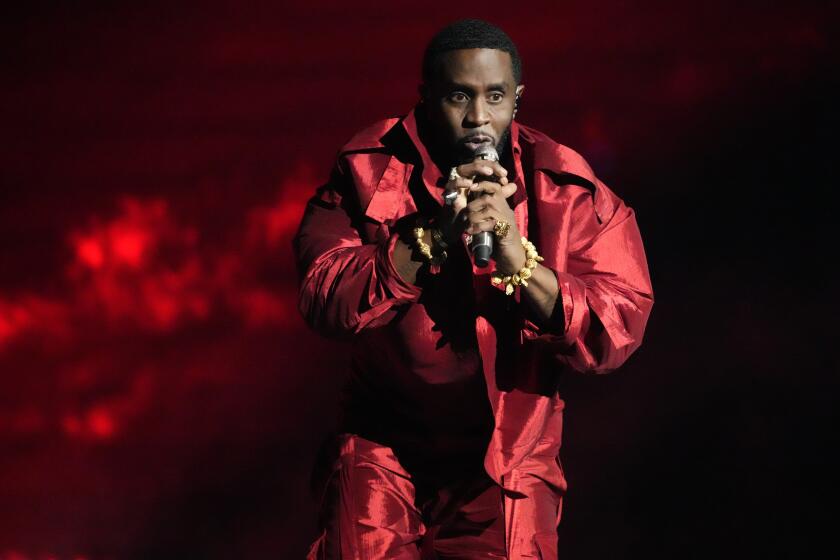Opinion: What’s different about Sean ‘Diddy’ Combs’ indictment compared with those of other alleged abusers?

Earlier this week, Sean Combs, better known as “Diddy,” was charged by a federal grand jury with racketeering and sex trafficking. Combs, like all defendants, is presumed innocent, but the allegations are damning. Beyond the abuse allegedly perpetrated by Combs personally, the indictment alleges that he relied on a network of employees and other close associates to facilitate and cover up his predation. The group allegedly thrived by demanding absolute loyalty and promoting Combs’ power, reputation and brand.
Incriminating as they are, the allegations are not particularly surprising. After all, rumors have long swirled about Combs’ potentially criminal behavior. And he is hardly alone. Over and over, the rich and famous have been accused of abusing their victims in plain sight and, often, relying on others to perpetrate and cover up the abuse, sometimes over decades. Bill Cosby. R. Kelly. Harvey Weinstein. Their power remained unchecked. Their popularity undented.
Sean “Diddy” Combs was the only defendant indicted this week in a sweeping sex trafficking and racketeering investigation. But federal prosecutors made clear that they do not believe he was the only one responsible. Is the indictment just the beginning of a larger case against alleged conspirators?
In Combs’ case, law enforcement acted quickly after the allegations surfaced. In March, Homeland Security agents searched his mansions in L.A. and Miami as part of the inquiry that led to this week’s indictment. Prompt intervention by law enforcement may be the only true means to stop the abuse.
Without it, the cycle can be self-reinforcing. Abusers use their power and networks to prevent their victims from speaking out, either through explicit threats or indirectly, exploiting a natural fear of their influence. As the public and law enforcement ignore the rumors, the barriers to speaking out only grow, furthering the sense of invincibility that emboldens abusers.
An expert explains how a perpetrator might entice and control victims, and what Combs’ indictment means about our changing views on how sex trafficking works.
Consider R. Kelly. Evidence of his abuse of underage girls first emerged in 1994, when a copy of his marriage certificate to then-15-year-old Aaliyah was leaked to the press. Similar rumors circulated for years, but he faced no consequences until a videotape showing Kelly and a seemingly underage girl having sex was leaked in 2002. But while his criminal case, for which he was eventually acquitted, lingered, his biggest hits were released and he continued to fill concert venues.
Public adulation in the face of persistent rumors furthered the cycle of abuse. By 2017, reports that Kelly was operating a cult and subjecting children to physical and sexual abuse were made by parents of alleged victims. Still, nothing happened, not even when another victim reported in 2017 that Kelly had abused her when she was a minor and provided a trove of evidence supporting her account. Law enforcement kept the evidence tucked in a drawer, only to be opened years later when the “Surviving R. Kelly” docuseries was released in 2019.
There is no shortage of blame for cycles of abuse like Kelly’s — and allegedly Combs’. It includes entourages who do the bidding of powerful men for money and proximity to fame and success. But it is shared by fans who look the other way and continue to support alleged abusers by buying their media and merchandise. It is worse when those fans mercilessly harass victims who speak out against their idols, often branding them as gold-diggers and sluts. The blame extends to the media that report too late or not at all, and, most important, to law enforcement, which does little to nothing when women find the courage to speak up.
Sean ‘Diddy’ Combs was arrested in New York after a grand jury indictment. Combs is facing multiple lawsuits and is the subject of a sweeping sex trafficking probe.
The reckoning — at least in the form of criminal charges — has started, although convictions remain elusive in many cases. With the advent of the #MeToo movement, the media sought out the accounts of women abused by powerful men, and some women gained confidence about speaking out as others were reporting the same or similar conduct by their abusers. Legislation such as the Adult Survivors Act in New York and the Sexual Abuse and Cover-Up Accountability Act in California have empowered victims to bring lawsuits against their abusers long after the abuse. And federal prosecutors have started to rely upon the racketeering statute, which allows them to present the full breadth of criminal conduct over decades rather than one-off, isolated incidents.
While blame is spread out among many, the responsibility to act squarely sits with law enforcement, and it cannot just be federal law enforcement. Moving forward, when women and men report sexual abuse, all law enforcement agencies must listen carefully and respond thoughtfully and act swiftly, as they appear to have done with the most recent allegations against Combs.
Elizabeth Geddes co-founded a law firm that represents victims in their pursuit of civil remedies against powerful men. She and her business partner led the investigation and prosecution of R. Kelly, who was convicted of racketeering and related offenses.
More to Read
A cure for the common opinion
Get thought-provoking perspectives with our weekly newsletter.
You may occasionally receive promotional content from the Los Angeles Times.













